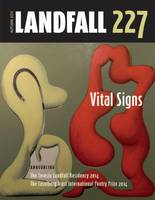Landfall 227 Vital Signs Autumn 2014
The latest issue of Landfall does indeed celebrate vital signs of life in our writing communities. This is a writing smorgasbord that not only offers tremendous fiction and poetry but that also presents writing that defies genre. There is writing here that sits in the non-fiction category but that veers in other directions. I really appreciate picking up a journal that places critical thinking alongside the telling of tales and the musical lift and surprise of poems. And that that critical thinking is full of welcome signs as opposed to the by-products of gated cul-de-sacs.
There were few poems that couldn’t hold my attention, some of the very best writing was near the back, and my accumulation of standout poems just grew and grew. Bouncing off the title, clichés abounded; New Zealand poetry is in good and diverse heart, there is vital blood pumping through our poetic veins. Ahh! I loved the way this selection made links to past and present, mainstream and offbeat, familiar and unfamiliar, and satellite poetry endeavours.
Here is a wee tour of my stallings:
Morgan Bach’s eye-catching moment in ‘Postcards,’ provides a sweet, melodic lull, vibrant detail and a catchy miniature narrative.
The delicious, nostalgic drive of Philip Armstrong’s ‘Portolan’ takes you right back to ‘when.’
There is the heady dislocation in a heritage library courtesy of Airini Beautrais’s ‘Finding the Dead.’
In Annalyse Gelman’s ‘My Legacy’ I loved the syncopated pattern of long and short lines.
Murray Edmond’s ‘Solomon’s Throw: Memoir of a Name’ is an inventive and agile response to the stunning tie between the West Indies and Australian cricket terms in 1960. Murray bounces from Allen Ginsberg’s ‘Howl’ to the childhood Solomon-Grundy chant to ‘The Song of Solomon’ in his surprising musings.
One of a number of poignant poems in the issue, Angela Andrews’s ‘Grandfather reacts to the way death and almost death are great prompters of story, of roads back into the past. Her detail is acute.
Each poem Sarah Jane Barnett writes just gets better and better. In ‘Relief,’ each line is nimble, the story fablesque, the poem rich in direction.
Carin Smeaton’s ‘Wishing Bone’ is like dialect in short snappy lines, with urban edge, getting into the head and ache of a woman/mother dispossessed.
Peter Black’s photographs, ‘Simple Beauty,’ are luminous poems.
Gregory O’Brien and Robin Kearns converse in ‘A Weekend on the Chathams’ (a geographer and a poet reflect back). Gregory’s poem-paintings (or painting-poems) are one response to how poet and geographer found it difficult to find ‘a voice to inhabit the elusive and often contested reality of the Chathams.’ Both looking for ‘crossed circuits, connections, conversations, rhymes and assonances.’ This lightness of touch from Gregory:
If there is
a moon
it is carved into
a dark tree. If
there is
a tree. But
there is always
an ocean.
Lynley Edmeades’s ‘Faute de Mieux’ offers musicality of detail and momentum.
Some of my favourite poems were sheltering near the back. Bernadette Hall’s piece, an extract from ‘Maukatere: Floating Mountain’ defies compartments. It is like a floating memoir that hooks imagination as much as recollection. It is poetry, and in that poetry, promotes curiosity. I want to read more!
I stalled on the moving twinges, revelations and contours of Vivienne Plumb’s ‘Nothing Trivial.’
I have already sung the praises of Zarah Butcher-McGunnigle’s Autobiography of a Margurite (there is an extract) here.
Alice Miller shows she is an exquisite wordsmith in ‘Observatory.’ Here is a taste:
Night comes for the ten thousandth time, sky growing
muddy with cloud, light squeezed out.
Are you there, a man says into his phone.
A storm is coming.
At the back are the results of The Caselberg Trust International Poetry Prize 2014. Sue Wootton’s comments include ‘eight [terrific] ways to make a poem that proved robust enough for my shortlist.’ Her final comment on the winning poem is equally astute: ‘[it] goes on giving up a little something new no matter how many times it’s read.’ I read Brian Turner’s winning ‘Mulching’ and I totally agreed. It quietly keeps creeping up on you. Runner-up was Annalyse Gelman’s ‘Auden.’
Submissions for Landfall 228 now closed. Due November 2014.
Submissions for Landfall 229 close January 10th 2015 (there is no theme). Due May 2015.


The long-line-short line was inspired by Anne Carson’s “Autobiography of Red” – check it out!
-Annelyse
LikeLike
Oh yes! I love that book.
LikeLike